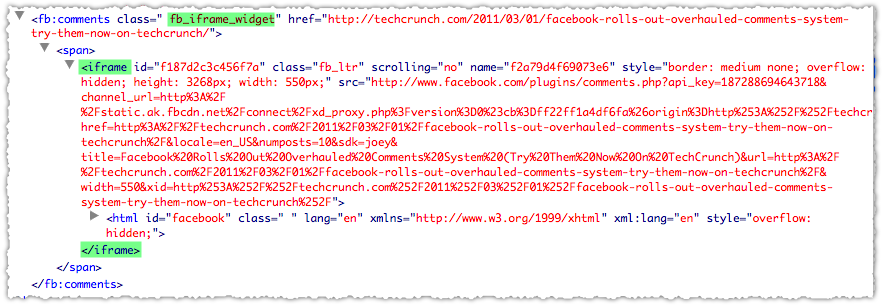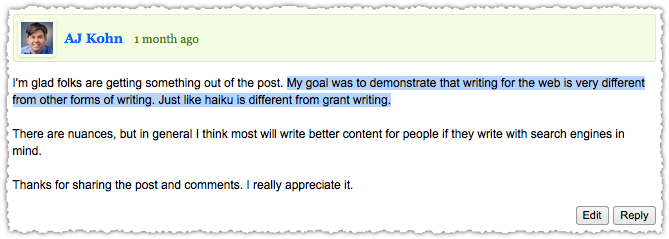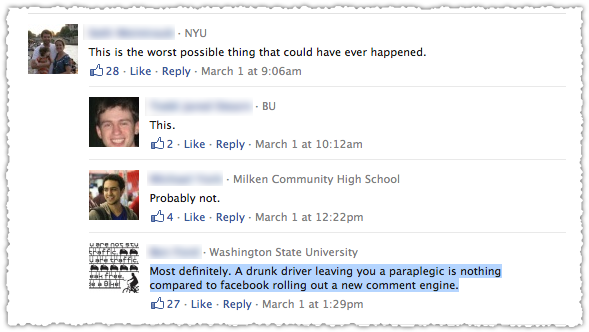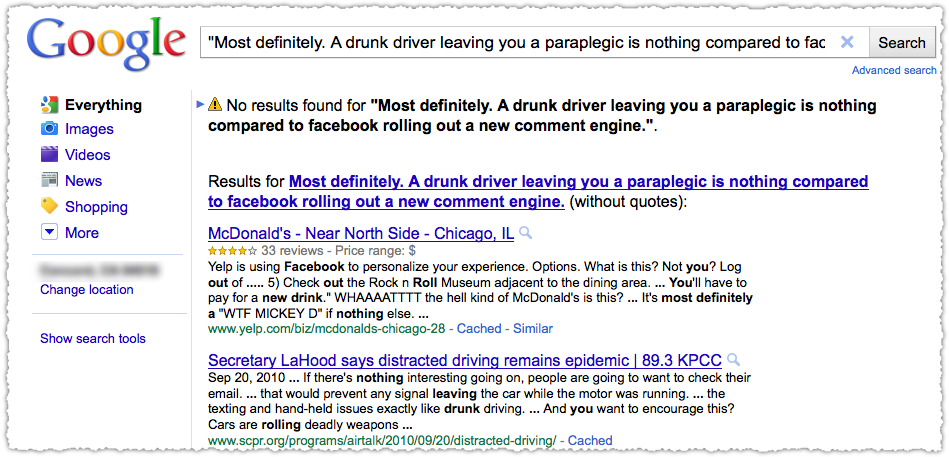Facebook Comments could be the most disruptive feature released by Facebook. Why? Comments are one of the largest sources of meta content on the web. Our conversations provide a valuable feedback mechanism, giving greater context to both users and to search engines.
The Walled Garden
Using Firebug you can quickly locate Facebook Comments and determine how they’re being rendered. Facebook Comments are served in an iframe.

This means that the comments are not going to be attributed to that page or site nor seen by search engines. In short, Facebook Comments reside in the walled garden. All your comments are belong to Facebook.
This differs from implementations like Disqus or IntenseDebate where the comments are ‘on the page’ or ‘in-line’. One of the easier ways to understand this is to grab comment text from each platform and search for it on Google. Remember to put the entire text in quotes so you’re searching for that exact comment phrase.
Disqus Comments
Here’s a comment I made at Search Engine Roundtable via Disqus.

Here’s a search for that comment on Google.

Sure enough you can find my comment directly at Search Engine Roundtable or at FriendFeed, where I import my Disqus comments.
Facebook Comments
Here’s a comment made via Facebook Comments on TechCrunch.

Here’s a search for this comment on Google.

In this instance you can’t find this comment via search (even on Bing). The comment doesn’t exist outside of Facebook’s walled garden. It doesn’t resolve back to TechCrunch.
I thought of an edge case where Facebook Comments might show up on FriendFeed (via Facebook), but my test indicates they do not.
Comments and SEO
Search engines won’t see Facebook Comments. That is a big deal. Comments reflect the user syntax. They capture how people are really talking about a topic or product. Comments help search engines to create keyword clusters and deliver long-tail searches. Comments may signal that the content is still fresh, important and popular. All that goes by the wayside.
It’s no secret that search engines crave text. Depriving Google of this valuable source of text is an aggressive move by Facebook.
Is this on purpose? I have to believe it is. I can’t know for sure but it’s curious that my Quora question has gone unanswered by Facebook, even when I’ve asked a specific Facebook Engineer to answer.
[Update] Ray C. He did wind up answering my question and provided some examples of how Facebook comments could be made visible to search engines. (Thank you.) Essentially you grab the comments via the API and display them inline behind the comment box, similar to using a noscript tag. It’s nice that they have this capability but most will simply use the default version without question or not apply this hack due to lack of technical expertise or time.
In addition, many have since noted that Google has started indexing Facebook comments. Problem solved right? Wrong! Google has always reserved the right to associate iframe content with a URL when it felt it was important. It just rarely did so. The truth of the matter is Google is still only indexing a small fraction of Facebook comments overall. So don’t count on Google indexing your Facebook comments.
Comment Spam

Comment spam is a huge problem. You know this if you’ve managed a blog for any amount of time. Google’s implementation of nofollow didn’t do much to stop this practice. So Facebook Comments is appealing to many since the forced identity will curtail most, if not all, of the comment spam.
This also means that the meta content for sites using Facebook Comments may be more pristine. This should be an advantage when Facebook does any type of Natural Language Processing on this data. A cleaner data set can’t hurt.
Article Sentiment
Extending this idea, you begin to realize that Facebook could have a real leg up on determining the sentiment of an article or blog post. Others might be able to parse Tweets or other indicators, but Facebook would have access to a large amount of proprietary content to mine page level and domain level sentiment.
Comment Reputation
Facebook can improve on sentiment by looking at comment reputation. Here’s where it gets exciting and scary all at the same time. Facebook can map people and their comments to Open Graph objects. It sounds a bit mundane but I think it’s a huge playground.
Suddenly, Facebook could know who carries a high reputation on certain types of content. Where did you comment? How many replies did you receive? What was the sentiment of those replies? What was the reputation for those who replied to you? How many Likes did you receive? How many times have you commented on the same Open Graph object as someone else?
You might be highly influential when commenting on technology but not at all when commenting on sports.
The amount of analysis that could be performed at the intersection of people, comments and objects is … amazing. Facebook knows who is saying what as well as when and where they’re saying it.
PeopleRank

Facebook Comments could go a long way in helping Facebook create a PeopleRank algorithm that would help them better rank pages for their users. If I haven’t said it recently, Facebook’s Open Graph is just another version of Google’s Search Index.
In this instance, Facebook seems to be doing everything it can to develop an alternate way of ranking the web’s content while preventing Google from doing so. (Or am I projecting my own paranoia on the situation?)
PeopleRank could replace PageRank as the dominant way to organize content.
Traffic Channel Disruption
The traffic implications of Facebook Comments are substantial. By removing this content from the web, Facebook could reduce the ability of Google and Bing to send traffic to these sites. The long tail would get a lot shorter if Facebook Comments were widely adopted as is.
We’ve seen some anecdotal evidence that referring traffic from Facebook has increased after implementing Facebook Comments. That makes sense, particularly in the short-term.
The question is whether this is additive or a zero-sum game. In the long-run, would implementing Facebook Comments provide more traffic despite the potential loss in search engine traffic via fewer long-tail visits?
For publishers, the answer might be yes. For retailers, the answer might be no. That has a lot to do with the difference between informational and transactional search.
Even posing the question shows how disruptive Facebook Comments could be if it is widely adopted. It could be the true start of a major shift in website traffic channel mix.
The Next Post: Google Personalized Search
The Previous Post: SEO and UX

9 trackbacks/pingbacks
Comments About Facebook Comments and SEO
// 18 comments so far.
Rob Diana // March 16th 2011
AJ
I was looking at the same problems with the comments. I could not find a way to get the comments outside of the post where they appear. Comments are not included in their Open Graph API either.
aj // March 16th 2011
Rob,
I’ve heard some conflicting information about whether you can access comments via the Open Graph API so I appreciate the confirmation. From an SEO standpoint I can’t get on board with Facebook Comments but with a larger perspective (pure marketing) I think it might make sense.
Aaron Bradley // March 16th 2011
Hey AJ
When the comment system was first opened up I conducted similar tests to yours, with the same results:
http://www.seoskeptic.com/are-facebook-comments-spiderable-implications-for-seo/
(Check out the comments there, where one reader has an interesting workaround to get the social benefits of the commenting system while rendering them spiderable.)
I’m still a little on the fence with this one. It runs against the very fiber of my SEO soul to advocate adoption of a UGC mechanism where valuable, relevant textual content (and the enhanced keyword universe such content brings to a page) is not made available to the search engines. And of course, there is the possible barrier to entry: hard to believe, but not everyone is on Facebook – and not Facebook user necessarily wants to subject their friends to a topical universe that may be professionally oriented (I fall into this category).
On the other hand, from a traffic and branding potential, Facebook comments have the ability to reach a large audience with trusted messages. Rather ironically, I think active blogs (ones that typically receive a lot of comments) stand to benefit from this more than ones with occasional comments (where the content value outweighs the limited broadcasting of comments made in Facebook).
So at this point, my recommendations as to whether a particular site should enable Facebook comments are being wrought on a site-by-site basis, and not without considerable hand-wringing. I’m definitely watching where this is going.
aj // March 16th 2011
Aaron,
Yes, I read your post right after Facebook Comments were posted and before publishing visited again and read that response. I’m not sure what to make of that solution since I’m uncertain how he’s obtaining those comments. But if he can get them you certainly could drop them into a noscript tag and have them render for search engines.
And I agree that while I can’t support it from an SEO perspective, it still might make sense! SEO isn’t everything, and in this instance removing comment spam and trolls, potentially increasing the quality of discourse on your property and getting more traffic from Facebook could be a net benefit.
I’m a bit uneasy about Facebook capturing such a large part of the web behind a walled garden, but it also presents some interesting possibilities.
Chris // March 16th 2011
Facebook is building it’s own little eco-system on the web. I, for one, will never use FB comments on my blog for exactly the reason you mentioned. They want all the content, advertising, and page views to themselves. They really are putting together an aggressive push to create a FB mini-web. Not on my watch!
aj // March 16th 2011
Chris,
You’re right, they’re absolutely creating their own mini-web. On a personal level I won’t be using Facebook Comments, but from a business perspective I like the fact that Facebook is pushing the envelope and Google.
tehk // March 16th 2011
You had a typo in your article where it read:
“All your comments belong to Facebook.”
Should have been:
“All your comments are belong to Facebook.”
aj // March 16th 2011
Tehk,
You’re right. My geek card should be revoked. Making that edit now.
Debby // March 27th 2011
When will we expect to see the outcome of all this RECENT maneuvering by FaceBook and Google to capture the market, gather data, market to groups, drive where people read and post? Do the users have any input?
Dax Davis // May 13th 2011
Looks like he responded to your question finally. He supplied some PHP code to pull the comments out of the iFrame. Now that makes it interesting…
http://www.quora.com/Are-Facebook-comments-crawlable
aj // May 16th 2011
Yes, he did. I’ve been meaning to update this post to reflect the new information provided. (Thank you for the reminder.) It’s an interesting solution but I wonder how many sites will go the extra mile to implement the work around. It’d be much nicer if they had this available by default.
indtvforum // May 25th 2011
I wish I could get more comments on my own blog to get discussions going. I notice just a couple of comments get others going, but getting the first comment or two is difficult.
ahwebdev // September 19th 2011
A great plugin for wordpress to take facebook comments out of the box and put it in html format.
Facebook AWD SEO Comments
Mike // February 24th 2013
This was posted some time ago now and I haven’t seen a lot of discussion within the last 12 months. Is Google still only indexing a small fraction of comments? And is it still advisable to perform the hack?
One of my clients has a custom built blog which is getting hammered with spam comments and very few legit ones. I was hoping by adding the FB comment box it may help to address both issues. I have always been aware of the iframe issue so have never really considered it as an option until now.
AJ Kohn // March 06th 2013
Mike,
To my knowledge Google is still only indexing a few select sites with the default Facebook comments installation. The sites must have high trust and authority for that to happen. So using the hack where you display the comments ‘behind’ the actual iframe is still likely your best bet if you want to use Facebook.
Glauco Gil // October 01st 2013
I came across your post by Google and made some tests and realized you are wrong. Google is already crawling comments very well and displaying it in the search results helping to boost traffic. You can check my own website on a specific page like http://sitepor500.com.br/index.php?q=criacao-site-divulgacao
Scroll down and grab the a comment like
sitepor500 Oi, poderias me passar pelo face o link? Gostei do assunto e preciso aprender mais!
Just copy/paste it on Google and you will see that Google crawled the website! It’s working, for sure.
Ken Ashe // June 14th 2016
It looks like discuss comments are counted by Google too. I’m just not sure how much weight they get (if any).
AJ Kohn // June 15th 2016
Yes Ken. Disqus comments can be rendered so that they are seen by Google. Overall, I think comments are given less weight than the main article content when Google can understand the difference between the two. I gather that’s rather high since the structure of comments is well defined.
But sometimes the comments can grow to be more important than the article itself so each specific comment might not be hugely important but as a whole they contribute a lot to the value and authority of that document.
Sorry, comments for this entry are closed at this time.
You can follow any responses to this entry via its RSS comments feed.